Petra walks into a brightly lit psychology lab, her senses assaulted by a cacophony of stimuli. The sterile white walls, flickering fluorescent lights, and pungent antiseptic odor create an overwhelming environment that challenges her cognitive and physiological well-being. As she navigates this unfamiliar space, Petra’s initial observations and subsequent reactions provide a fascinating case study in the impact of environmental factors on perception and behavior.
The lab’s sensory overload triggers a cascade of physiological responses, including increased heart rate, sweating, and dilated pupils. These physiological manifestations are indicative of the body’s “fight or flight” response, a primal reaction to perceived threats or stressors. Simultaneously, Petra’s cognitive processes are affected, leading to impaired attention, reduced memory recall, and difficulty making decisions.
Petra Walks into a Brightly Lit Psychology Lab

Petra stepped into the brightly lit psychology lab, her senses immediately assaulted by a barrage of stimuli. The stark white walls reflected the harsh overhead lighting, creating an almost blinding glare. The air was thick with the antiseptic scent of cleaning chemicals, and the hum of computers and machinery filled her ears.
As she walked deeper into the lab, she noticed rows of sterile chairs lined up in neat rows, their cold metal frames glinting under the lights. The atmosphere was sterile and impersonal, making Petra feel like a specimen under observation.
Sensory Overload and Cognitive Impact
The sensory overload of the lab had a profound impact on Petra’s senses. The bright lights caused her eyes to strain, and the harsh chemical smell made her throat feel raw. The constant hum of machinery drowned out her thoughts, making it difficult to concentrate.
She felt disoriented and overwhelmed, her cognitive processes slowed and confused. The overwhelming environment made it difficult for her to perceive and process information clearly.
Physiological Responses
Petra’s exposure to the lab environment triggered a cascade of physiological responses. Her heart rate and breathing increased, and her palms became sweaty. Her body was preparing itself for a fight-or-flight response, even though there was no immediate threat. The autonomic nervous system and hormonal responses were working in tandem to prepare Petra for action.
Emotional and Behavioral Manifestations
The overwhelming environment of the lab induced a state of anxiety and stress in Petra. She felt a sense of unease and apprehension, as if she were being judged or evaluated. Her emotional state led to behavioral changes, such as fidgeting, pacing, and avoiding eye contact with others.
These behaviors were a manifestation of her anxiety and a way to cope with the stressful environment.
Environmental Influences on Perception, Petra walks into a brightly lit psychology lab
The physical and social aspects of the lab influenced Petra’s perception of the situation. The sterile and impersonal environment created a sense of detachment and isolation, making her feel like an outsider. The presence of other people in the lab, such as researchers and students, added to her feelings of self-consciousness and anxiety.
Social cues, such as the expectations and behaviors of others, also shaped her perception of the lab and her role within it.
Cognitive Adaptation and Coping Mechanisms
To cope with the overwhelming environment, Petra employed various cognitive strategies. She tried to focus on the task at hand and ignore the distractions around her. She also tried to reframe her thoughts, interpreting the situation as a challenge rather than a threat.
These coping mechanisms helped her to reduce stress and anxiety and adapt to the demanding environment.
FAQ: Petra Walks Into A Brightly Lit Psychology Lab
What is sensory overload?
Sensory overload occurs when an individual is exposed to an overwhelming amount of sensory stimuli, leading to cognitive and physiological impairments.
How does sensory overload affect cognitive function?
Sensory overload can impair attention, memory recall, and decision-making abilities.
What are the physiological responses to sensory overload?
Physiological responses to sensory overload include increased heart rate, sweating, and dilated pupils.
How can we cope with sensory overload?
Coping mechanisms for sensory overload include taking breaks, practicing relaxation techniques, and reducing exposure to overwhelming stimuli.


